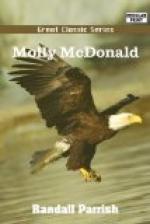In the earliest gray of dawn the two wearied men crept out upon the upper plateau, dragging their horses. Behind, the mists of the night still hung heavy and dark over the valley, yet with a new sense of freedom they swung into their saddles, faced sternly the chill wind of the north, and rode forward across the desolate snow fields. It was no boys’ play! The tough, half-broken Indian ponies kept steady stride, leaping the drifts, skimming rapidly along the bare hillsides. From dawn to dark scarcely a word was uttered. By turns they slept in the saddle, the one awake gripping the others’ rein. Once, in a strip of cottonwood, beside a frozen creek, they paused to light a fire and make a hasty meal. Then they were off again, facing the frosty air, riding straight into the north. Before them stretched the barren snow-clad steppes, forlorn and shelterless, with scarcely a mark of guidance anywhere, a dismal wilderness, intersected by gloomy ravines and frozen creeks. Here and there a river, the water icy cold and covered with floating ice, barred their passage; down in the valleys the drifted snow turned them aside. Again and again the struggling ponies floundered to their ears, or slid head-long down some steep declivity. Twice Hamlin was thrown, and once the Osage was crushed between floating cakes and submerged in the icy stream. Across the open barrens swept the wind into their faces, a ceaseless buffeting, chilling to the marrow; their eyes burned in the snow-glare. Yet they rode on and on, voiceless, suffering in the grim silence of despair, fit denizens of that scene of utter desolation.
At the Cimarron the half-frozen Indian collapsed, falling from his saddle into the snow utterly exhausted. Staggering himself like a drunken man, the Sergeant dragged the nerveless body into a crevice of the bluff out of the wild sweep of the wind, trampled aside the snow into a wall of shelter, built a hasty fire, and poured hot coffee between the shivering lips. With the earliest gray of another dawn, the white man caught the strongest pony, and rode on alone. He never knew the story of those hours—only that his trail led straight into the north. He rode erect at first, then leaning forward clinging to the mane; now and then he staggered along on foot dragging his pony by the rein. Once he stopped to eat, breaking the ice in a creek for water. It began to snow, the thick fall of flakes blotting out the horizon, leaving him to stumble blindly through the murk. Then darkness came, wrapping him in a cloak of silence in the midst of that unspeakable desert. His limbs stiffened, his brain reeled from intense fatigue. He dragged himself back into the saddle, pressing the pony into a slow trot. Suddenly out of the wall of gloom sprang the yellow lights of Camp Supply. Beneath these winking eyes of guidance there burst the red glare of a fire. Even as he saw it the pony fell, but the exhausted man had forgotten now everything but duty. The knowledge that he had won the long struggle brought him new strength. He wrenched his feet free from the stirrups, and ran forward, calling to the guard. They met him, and he stood straight before them, every nerve taut—a soldier.




